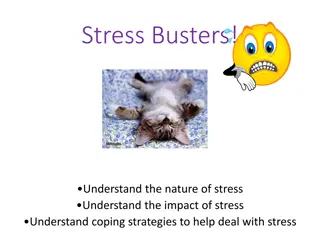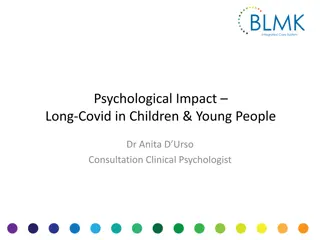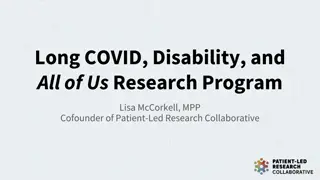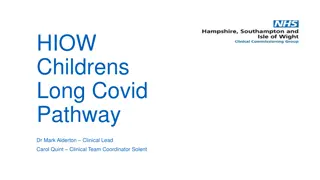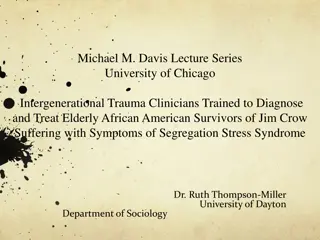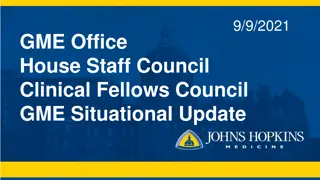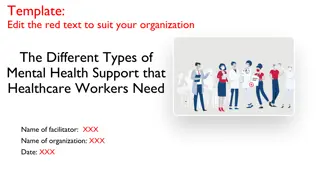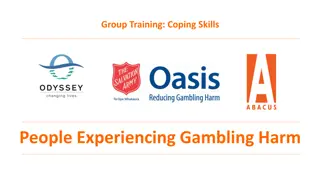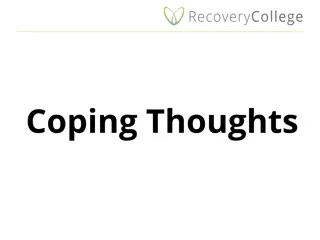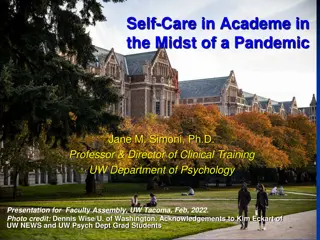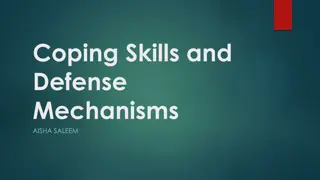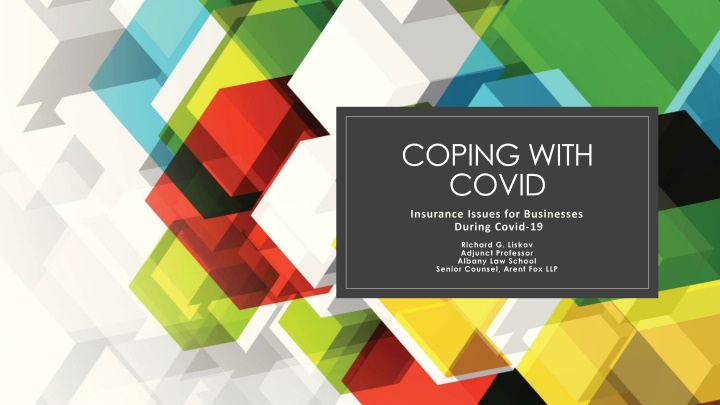
Managing Insurance Issues for Businesses During Covid-19
Explore how Covid-19 has impacted insurance coverage for businesses in New York, including property and CGL policies. Learn about regulatory developments and the challenges faced by small businesses during the pandemic. Gain insights from Richard G. Liskov, an expert in insurance regulatory law.
Download Presentation

Please find below an Image/Link to download the presentation.
The content on the website is provided AS IS for your information and personal use only. It may not be sold, licensed, or shared on other websites without obtaining consent from the author. If you encounter any issues during the download, it is possible that the publisher has removed the file from their server.
You are allowed to download the files provided on this website for personal or commercial use, subject to the condition that they are used lawfully. All files are the property of their respective owners.
The content on the website is provided AS IS for your information and personal use only. It may not be sold, licensed, or shared on other websites without obtaining consent from the author.
E N D
Presentation Transcript
COPING WITH COVID Insurance Issues for Businesses During Covid-19 Richard G. Liskov Adjunct Professor Albany Law School Senior Counsel, Arent Fox LLP
About the Speaker Richard G. Liskov has practiced insurance regulatory law as Partner and Senior Counsel in various major law firms since 1992, including Arent Fox, Holland & Knight, and White & Case,, and formerly served as Deputy Superintendent and General Counsel of the New York State Insurance Department (now the New York State Department of Financial Services). Previously, State Attorney General Robert Abrams appointed him an Assistant Attorney General for the State of New York, in which capacity he handled litigation for the Insurance Department among other state agencies. In private practice Mr. Liskov has provided a comprehensive range of insurance regulatory services to insurers, reinsurers, producers, and financial institutions dealing with licensed insurers, as well as one of the world s leading sellers of computers and portable electronics which offers service contracts and portable electronics insurance on such products. Since 2019 he has taught online courses in U.S. Insurance Regulation at Albany Law School and the School of Law of Boston University. From 2012 to 2017 Mr. Liskov was a lecturer-in-law at Columbia Law School conducting an upper-class seminar on U.S. insurance regulation. He has written articles on insurance regulation for The Wall Street Journal, Business Insurance, and American Banker, among other publications. Mr. Liskov has been a member of the Insurance Law Committee of the New York City Bar Association, including the Sub-committee on Legislation and Regulation.
Mr. Mr. Liskov s Liskov s DISCLAIMER DISCLAIMER I am not acting as attorney for any person or entity in this presentation. All of the statements I make and all of the positions I espouse are my personal views, and these statements and positions do not purport to represent, and should not be considered as, the statements and positions of any law firm with which I have been affiliated, or of any attorney at such firm, or of any client of such firm.
Types of Insurance New York Business Policyholders Typically Buy Property o Business Interruption Commercial General Liability (CGL) Workers Compensation Health Coverage for Employees
How COVID Has Affected Property and CGL Coverage in New York Regulatory developments The New York State Department of Financial Services issued an Emergency Regulation in force between March 30 and July 6 which prohibited cancellation, non-renewal, or conditional renewal of a property or CGL policy for 60 days for non-payment of premium if the policyholder was a small business suffering financial hardship due to COVID, defined as one: having a New York place of business, and having fewer than 100 employees, and was independently owned not a subsidiary or affiliate of another company, and submitting a written attestation under penalty of perjury that it was suffering financial hardship due to COVID. See 11 NYCRR Part 229
How COVID Has Affected Property and CGL Coverage in New York Regulatory Developments The Emergency Regulation required property and casualty insurers, and brokers and agents, to notify New York policyholders, by April 8,of their right to have their coverage extended for sixty days, even if no premium were paid, and to have their premiums deferred and paid over a period of twelve months, if they qualified as a small business suffering financial hardship due to COVID and submitted the written attestation. The Emergency Regulation also prohibited premium finance agencies from invoking their power of attorney to cancel a policy of a qualified small business for non-payment of premium for 60 days. If your business met the specified criteria for deferred treatment and you did not receive such a notice, or if your insurer or premium finance agency did not honor your request for premium deferral after your business submitted the written attestation, you should file a complaint containing specific facts with the Department of Financial Services. https://www.dfs.ny.gov/complaint
How COVID Has Affected Property Coverage in New York Litigation Developments Business Interruption Coverage Cases Over twelve hundred cases have been brought around the U.S. since March seeking coverage for business interruption losses caused by governmental orders requiring businesses to close or restricting the hours during which businesses can stay open. So far, about 70% have been won by insurance companies before trial. See https://cclt.law.upenn.edu/#latest (University of Pennsylvania Law School COVID Litigation Tracker) Insurers have almost always resisted paying these claims on the ground that the policy language requires proof of direct physical damage which the coronavirus does not cause. Also, in many cases the policies contained a specific exclusion for pandemics or known viruses or infectious diseases. Over 135 cases have been voluntarily dismissed so far by plaintiffs who did not wish to continue litigating over their insurers opposition.
How COVID Has Affected Property Coverage in New York Business Interruption Coverage Cases A New York Law Journal article in November summarized the reported decisions from outside of New York. See https://www.law.com/newyorklawjournal/2020/11/12/covid-19-business- interruption-claims-the-current-lay-of-the-land/ The majority of reported decisions to date have held that COVID does not cause direct physical loss or damage to the insured property so as to trigger business interruption coverage, but there have been a few contrary rulings. To date, no decisions on this question have issued from New York state courts, and, compared to other states, relatively few cases have been brought in New York, partly because New York has gained a reputation of being relatively unfriendly to policyholder claims and partly because policyholder counsel-- seeking to mount class actions on behalf of numerous policyholders suing the same insurer-- tend to look for friendlier jurisdictions outside of New York in which to bring a class action.
How COVID Has Affected Property Coverage in New York Nevertheless, some business interruption coverage cases have been brought in New York state and federal courts arising from COVID-related closures, including a class action against twenty- seven insurers that was filed in August in Brooklyn by well-known New York City restaurants. See Swarm of New York restaurants sue insurers for COVID-19 cover , Business Insurance, August 4, 2020. The restaurants allege that they all had to re-arrange entrances, exits and interior spaces at their respective establishments amounting to direct physical damage and therefore they are owed business interruption coverage as provided in their respective all risk policies which apparently contained no specific exclusions for known viruses or pandemics.
How COVID Has Affected Property Coverage in New York In one case brought in federal district court in Manhattan in May, the court denied a preliminary injunction requiring the insurer to pay insurance proceeds to the policyholder immediately for COVID-19 damages. A transcript of the hearing quotes the federal judge saying: I feel bad for your client. I feel bad for every small business that is having difficulties during this period of time. But New York law is clear that this kind of business interruption needs some damage to the property to prohibit you from going. You get an A for effort, you get a gold star for creativity, but this is not what s covered under these insurance policies. Social Life Magazine, Inc. v. Sentinel Insurance Co. Ltd., No. 20-cv-3311 (VEC) (S.D.N.Y.), The court focused on the direct physical loss of or damage to insured property requirement in the policies. New York courts have long applied this requirement to business interruption claims. See, e.g., Roundabout Theatre Co., Inc. v. Continental Casualty Co., 302 A.D.2d 1 (N.Y. App. Div. 1st Dep t 2002), which held that, under New York law, the language of the policy clearly and unambiguously provided business interruption coverage only where the insured s property suffered direct physical damage. The federal court also had difficulty understanding how COVID could cause physical damage to property as opposed to making individuals ill. The court implied that the insured s damage was caused by the Governor s stay-home order and not by any particular damage to the insured s property
How COVID Has Affected Property Coverage in New York The Department of Financial Services has a FAQ web page discussing what you need to know about business interruption coverage. https://www.dfs.ny.gov/consumers/coronavirus/business_interruption_insurance_faqs (Incidentally, off-topic, the Department also has a FAQ page for businesses making claims for property damage caused by riots and civil commotion.) See https://www.dfs.ny.gov/consumers/guidance/rioting_civil_commotion_emerg_reg/faqs
How COVID Has Affected Property Coverage in New York Some property insurance policies have business interruption coverage when civil authority orders prevent access to the insured property. Typically these clauses require actual physical damage to the insured property or nearby properties. See, e.g. Diesel Barbershop, LLC v. State Farm Lloyds, 2020 WL 4724305 (W.D. Tex. Aug. 13, 2020) (dismissing suit against insurer where plaintiff barbershop could show no physical damage to property ordered closed) But there have been some, if relatively few, property insurance policies written with civil authority clauses which do not expressly reference property damage, for example, with language such as: This policy is extended to cover the loss sustained during the period of time when, as a result of a peril not excluded, access to real or personal property is prohibited by order of civil or military authority. Obviously, you will want to check if similar language is found in your policy that has been in force since March, 2020. See https://www.arentfox.com/perspectives/alerts/there-civil-authority-coverage-covid-19-claims
How COVID Has Affected Property Coverage in New York What You Need to Do IF You Have Business Interruption Coverage Make sure you have the complete policy, including every single rider and endorsement. Contact the agent or broker who sold you the policy and ask that producer to clearly explain to you every provision of the policy relevant to your possible claim, including deductibles, co-pays and required notice provisions. Look to see if the policy contains a pandemic, epidemic, known virus , communicable diseases or infectious diseases exclusion. If not, you might be able to recover. But if such an exclusion is present, it is extremely unlikely you will win. See if there is a civil authority clause that does not require proof of physical damage. Ask the broker or agent whether the insurer might be persuaded to settle a relatively small claim without litigation, because, for example, the producer is a valuable one for the insurer in your area, or because your own insurance has been very profitable for the insurer for many years. Ask the broker or agent what her or his experience has been in presenting similar claims to that insurance company over the years some insurers have been known to make ex gratia payments, even though courts would likely rule that the policy would not cover the claim if it were litigated, in order to keep getting lucrative premiums from a policyholder. If you decide to sue your insurer, make sure you have organized every possibly relevant document for your counsel, be prepared to pay for an expert accountant to quantify your losses, be prepared for you and your accountant to be grilled in lengthy depositions, be prepared to spend tens of thousands of dollars on legal fees, expert witness fees and court costs, and to wait years, including the time for the insurance company to mount multiple appeals, before you see even one penny in recovery. Make sure whomever you select as your counsel has decades of experience litigating business interruption claims against big insurers. This is not a forum for a rookie to gain experience.
How COVID Has Affected Property Coverage in New York Legislative Developments Legislation has been introduced in New York and various other states to require insurers to cover business interruption claims arising from COVID-related mandatory closures without regard to a virus exclusion. The New York bill, A. 10226B, applies to any insurance policy in force as of March, 2020 covering business interruption for any business with 250 employees or fewer. To date the New York legislation has been referred to the Insurance Committees in each house of the Legislature, but has not advanced. The New York City Bar Association issued a report last June on the proposed legislation discussing the constitutional issues, such as alleged impairment of contracts, as well as certain drafting problems, raised by the bill. See https://s3.amazonaws.com/documents.nycbar.org/files/2020712- BusinessInterruptionInsurance.pdf
How COVID Has Affected Property Coverage in New York Congress is considering legislation which would require business interruption insurers to pay claims under policies without an exclusion for pandemics, but would have the Federal Government reimburse insurers for excess losses. See H.R. 7011 (Pandemic Risk Insurance Act) This approach would be similar to the Terrorism Risk insurance Act under which terrorism insurance must be offered by commercial property and liability insurers, but the Government acts as reinsurer for a specified percentage of the losses. See Pub. L. 116-94 amending Pub. L. 107-297
How COVID Has Affected Liability Coverage in New York So far, there do not seem to be reported cases filed around the country against liability insurers for refusing to pay a claim for negligence by an invitee alleging that the insured business has negligently exposed the person to COVID while on the business premises. If you are served with a summons and complaint alleging such a claim, you must immediately contact the agent or broker who sold you the policy and send a copy of the summons and complaint to her, him or the insurer. Failure to provide reasonably prompt notice to the insurer is a ground for the insurer refusing to cover the claim. Ask your agent or broker if there is a specific exclusion in the policy for liability arising from known viruses , pandemics, epidemics, communicable diseases or infectious diseases . If so, your insurer may disclaim coverage outright, or the insurance company may send you a reservation of rights letter stating it will defend the suit but will not indemnify you against an adverse judgment, if liability arises from those excluded causes. Ask if there is a force majeure or act of God or pollution exclusion in the policy which also may lead the insurance company to disclaim or reserve rights. Be prepared to show the insurer you and your employees complied with all applicable COVID governmental mandates, e.g. closure restrictions, mask requirements, social distancing rules, hand washing etc. If a judge or jury found you were grossly negligent or reckless about compliance and imposed punitive damages, your insurer is prohibited by law from covering punitive damages in New York.
How COVID Has Affected Liability Coverage in New York Sometimes it is possible for an insured whose continued business is important to the insurance company to obtain the insurer s consent to utilize the insured s chosen counsel to defend the suit, although the insurance policy almost always allows the insurance company to select defense counsel, and usually the insurance company will do so from a roster of lawyers in whom the insurer has confidence. You are contractually required to cooperate with defense counsel in terms of making relevant documents and knowledgeable witnesses available promptly during the discovery phase of the lawsuit and if a trial is scheduled.
How COVID Has Affected Workers Compensation Benefits in New York So far, the New York State Workers Compensation Board has not issued a regulation or directive making an employee s claim for workers compensation benefits for COVID to be presumptively compensable as a workplace illness or injury, even if the employee cannot prove that she or he became infected at the employer s workplace. Some states like California have done this. The Board has issued a FAQ webpage for employees indicating the kind of evidence the employee would have to show in making a claim for benefits due to exposure to COVID at work. http://www.wcb.ny.gov/content/main/TheBoard/covid-19-workers-compensation-q-a-june-2020.pdf It is likely that employees in the health care and transportation fields who are able to show that they faced significantly elevated risk of infection at work would be able to recover benefits. Office workers, on the other hand, are likely to face significant hurdles in showing that they were infected at work, rather than suffering one of the ordinary diseases of life . See, e.g., Easly v. D&O Contractors, 895 So.2d 23 (La. Cir. Ct. 2005) (no benefits for contracting West Nile virus absent evidence that it was an occupational disease); Taylor v. City of Titusville, 288 So.3d 731 (Fla. Dist. Ct. 2019) (fungal meningitis); If you receive a claim of occupational illness arising from COVID from an employee, you must immediately contact your worker s compensation carrier and provide relevant information and witnesses.
How COVID Has Affected Workers Compensation Benefits in New York Legislation has been introduced in the New York State Legislature, A.10401/S. 8266, to deem COVID to be an occupational disease compensable for sick or deceased employees who work for any businesses deemed to provide essential services during an outbreak of COVID, including, specifically, any retail facility workers, and any workers who do any work outside the home during a period of closure of non-essential businesses . These bills have been referred to the respective Labor Committees in each house, but have not yet advanced. https://www.nysenate.gov/legislation/bills/2019/a10401
How COVID Has Affected Employees Health Insurance in New York If you provide health insurance for your employees entirely through a self-funded ERISA plan, and no licensed health insurer or HMO provides coverage directly, the various Emergency Regulations and directives of the New York State Department of Financial Services do not apply. If you have purchased health insurance for your employees from a licensed health insurer or HMO, then you should know: Tele-health services to New York residents rendered by an in-network provider must be covered without co-pays and deductibles, at least through January 7, 2021. Insurers may not charge deductibles and co-pays for COVID diagnostic tests, but deductibles and co-pays do apply for COVID treatments just as they do for other medical service, at least through January 7, 2021. For employees defined by regulation as essential workers , who were working as of March 7, 2020, including retail workers at essential businesses (e.g., grocery stores, pharmacies, convenience stores, gas stations, and hardware stores) , no deductibles and co-pays can be imposed for in-network outpatient mental health services (unless in accord with a high deductible plan authorized by the Internal Revenue Code) See Sixtieth Amendment to 11 NYCRR Part 52, dated September 29, 2020 Employers are still required to notify workers being terminated of their right to obtain COBRA coverage at their expense.
Thanks! My thanks to the following attorneys who assisted me in preparing this presentation: James Westerlind and Elizabeth Satarov of Arent Fox LLP Alan W, Borst, Jr., President WillieBorstADR Maria C. John and Fred Garsson of the Insurance Law Committee of the New York City Bar Association





